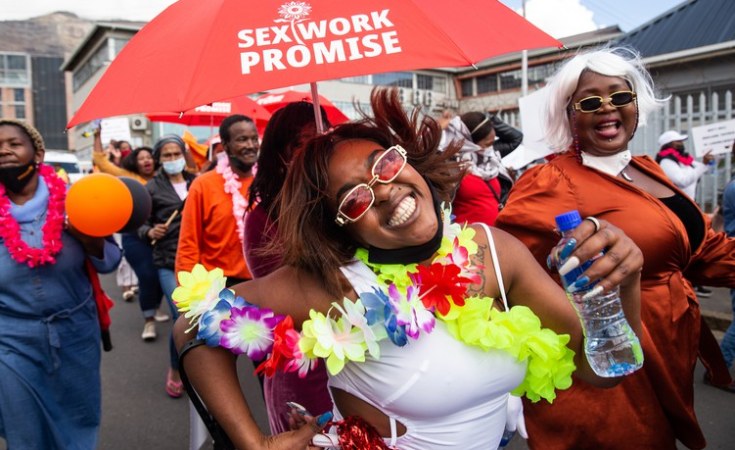Decriminalisation will address the stigma sex workers face in this country, organisations say
Over 100 sex workers and their supporters marched to the offices of the Department of Justice and Constitutional Development (DOJ) in Cape Town on Thursday to advocate for the full decriminalisation of sex work.
Members of the Sex Workers Education & Advocacy Taskforce (SWEAT), Asijiki Coalition, Sisonke national sex workers movement, and others, called on the department to update the public on progress with the decriminalisation bill since the public comments process closed on 31 January.
Outside the offices of the DOJ, supporters of sex workers sang, "We are ready for decrim". They held placards that read "Not a crime", "Do not decide for sex workers", and "We won't be silenced".
"We want to remind the department that we are monitoring the process in order to ensure that momentum is not lost," they said in a letter handed over to the department. The members also expressed their gratitude to the DOJ "for the manner in which they have delivered on their promise thus far with regards to the law reform process".
Reading the memorandum before the DOJ offices, SWEAT activist Pamela Ntshekula said: "We are here to say we are not criminals; that sex worker rights are human rights and that decriminalisation of sex work needs to be prioritised".
Ashika Singh, the DOJ's provincial director of legal administration in the Western Cape, addressed the crowd and reminded them of the Bill of Rights that affirmed their right to equality, human dignity, their bodily and psychological integrity, and right to healthcare, among other things. She thanked them for "monitoring the work that is being done by our government".
Singh also said that the letter would be handed to Deputy Minister of Justice John Jeffery and the Director-General Doctor Mashabane.
The crowd cheered "Thank you Ashika" and "Thank you DOJ".
Lloyd Rugara, provincial coordinator at Sisonke, said that decriminalisation would allow sex work to be recognised as actual work. He said it would help sex workers address the gender-based violence that they face from pimps and the police. Rugara said that sex workers are still stigmatised at police stations and in healthcare facilities.
SWEAT spokesperson Megan Lessing said that decriminalisation would "address the incredible stigma sex workers face in this country" and that this would in turn lead to less harassment by police and members of their community.
Lessing said that SWEAT receives a lot of complaints from community members about sex workers that unfairly make them out to be villainous.


